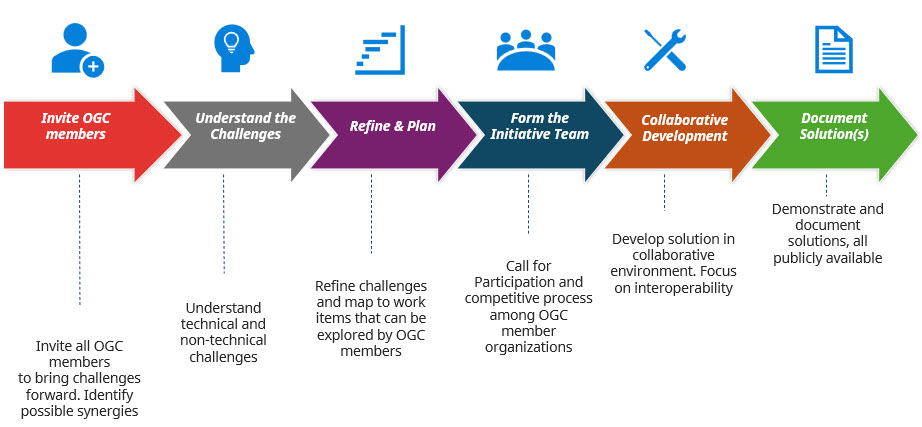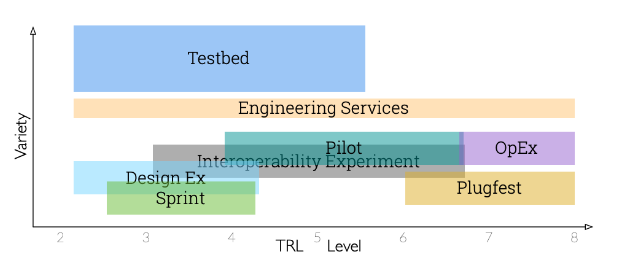OGC COSI Program
The Collaborative Solutions and Innovation Program (COSI) fosters cutting-edge solutions to global challenges by funding and supporting collaborative research and development Initiatives. It brings together broad stakeholders, including individuals, small and large businesses, government agencies, and research institutions, to address critical issues such as climate change and disaster resilience.
The work of the OGC’s COSI Program is guided by COSI’s Policy and Procedures.
OGC’s COSI Program offers many benefits to Sponsors of, and Participants in, COSI Initiatives, including:
For Sponsors:
- Targeted Research: Sponsors can direct research towards specific challenges and opportunities, ensuring that the outcomes align with their strategic goals.
- Cost-Effective Solutions: By sharing development costs and leveraging the expertise of different participants, sponsors can achieve cost-effective solutions.
- Early Access to Innovation: Sponsors gain early access to innovative technologies and solutions, providing a competitive advantage in the market.
- Influence on Standards: Sponsors can influence the development of OGC Standards, shaping the future of the geospatial industry.
- Networking and Collaboration: COSI provides a platform for sponsors to network and collaborate with leading experts and organizations in the geospatial field.
For Participants:
- Funding Opportunities: Participants can secure funding for research and development projects, accelerating innovation.
- Collaboration and Knowledge Sharing: COSI facilitates collaboration and knowledge sharing among participants, fostering a dynamic learning environment.
- Access to Expertise: Participants gain access to a broad pool of expertise, enhancing their capabilities and knowledge base.
- Real-World Impact: Participants contribute to developing solutions that address real-world challenges, making a tangible difference in various sectors.
- Market Visibility: Participation in COSI initiatives enhances market visibility and recognition for organizations and their solutions.

COSI seeks to incrementally increase the Technology Readiness Level (TRL) of geospatial IT solutions. NASA developed the TRL scale to help assess a technology’s maturity and consistently compare maturity between different types of technologies:

Initiatives conducted under OGC’s COSI Program are categorized and managed according to their TRL level. They differ in complexity, duration, and sponsoring concepts:

The types of Initiatives organized under COSI are:
- Design Experiments develop ideas into new specifications, e.g., a new API type, data model, or data container.
- Sprints experiment with emerging ideas in the context of geospatial standards, help improve interoperability of existing standards by experimenting with new extensions or profiles, are used as proof of concept for other OGC Collaborative Solutions and Innovation initiatives, or support OGC Standards Program activities.
- Interoperability Experiments identify and overcome obstacles to seamless data exchange and processing across different platforms and applications.
- Pilots apply and test OGC Standards in real world environments. Pilot projects are an opportunity for users to understand how to best address their requirements using standards-based architectures.
- Testbeds provide a unique platform where sponsors can outsource the rapid development of prototypes and test environments with a number of leading organizations in their field. Run annually, testbeds provide a rapid and efficient way for delivering proof-of-concept implementations. They also deliver recommendations for new or updated standards, developer guides, architecture blueprints and community best practices for addressing emerging interoperability challenges. of making geospatial information more Findable, Accessible, Interoperable and Reusable (FAIR).
OGC’s collaborative approach to problem solving means each Initiative participant retains copyright ownership of its original work. Only collaboratively developed results, documented in official deliverables (see this list of Completed COSI Initiatives for examples of published deliverables), belong to and are owned by OGC, as detailed in OGC’s Intellectual Property Rights policy.
COSI Initiatives do not develop operational products. They result in prototypes that demonstrate possible solutions to a problem. It is up to the Initiative Sponsor to commission the development of operational products.